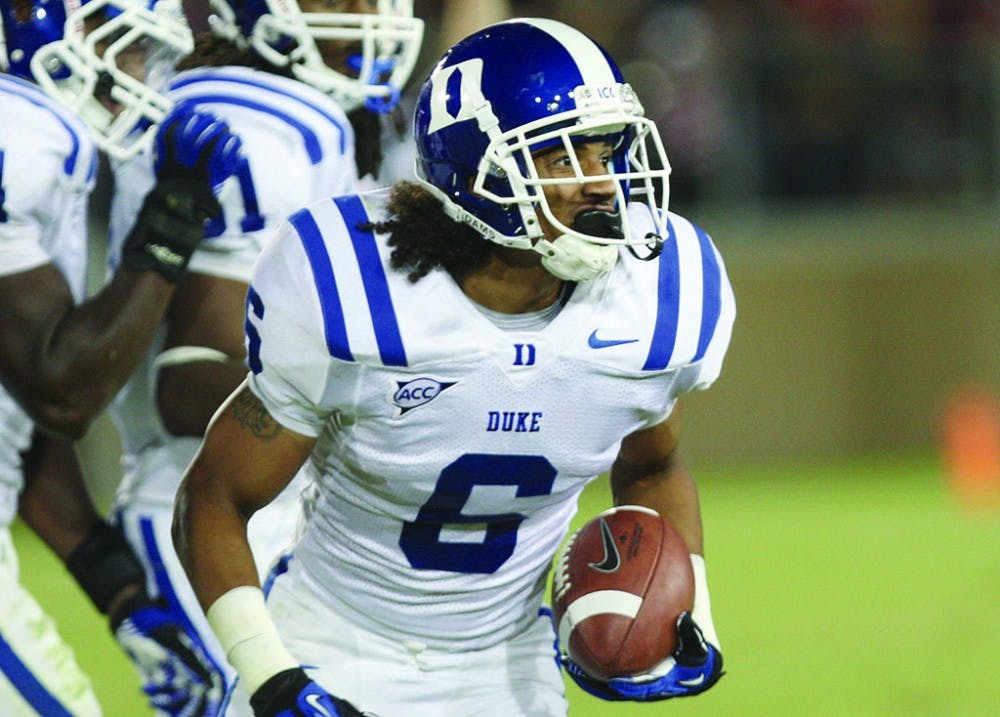One play from Ross Cockrell’s freshman season sticks out in his mind. In his second start, a 54-48 loss to Wake Forest, he got burned—badly—by wide receiver Chris Givens. It certainly was not the first time a receiver beat him, and it would not be the last, but after the play Givens turned to Cockrell and said something he remembers to this day.
“[Givens] wasn’t really talking trash, but he just told me, ‘Hey man, you ain’t good,’” Cockrell said. “I was like, well, ‘I really haven’t been playing well, so he might be right.’”
Two seasons later, it is hard to believe that anyone doubted the corner from Waxhaw, N.C., let alone Cockrell himself. The redshirt junior was named a captain before the year started, and halfway into the season he leads the nation in passes defended with 13. Through six games, he has four of his team’s seven interceptions and is second on the team in tackles. His four picks lead the ACC.
But the success Cockrell has enjoyed so far this year stands in stark contrast to the struggles he dealt with his freshman year. After redshirting the year before, Cockrell spent much of the 2010 season adjusting to the level of play at the collegiate level.
“A lot of players that are young do things their own way. It’s just natural,” Cockrell said. “I did the same thing. I felt like I knew what to do, and I wanted to do it my way.”
Targeted by opposing quarterbacks, he ended up leading the team with three interceptions but broke up just seven passes all season and rarely walked off the field feeling satisfied by his overall performance.
“I wasn’t playing well at all,” Cockrell said. “It’s no secret that I struggled my first year playing.”
Head coach David Cutcliffe recognized that Cockrell was allowing his inexperience to detract from his raw ability on the field, and continually reassured Cockrell that he would be making a contribution to the team in the near future. He had sold Cockrell on his vision for Duke football when he recruited him, and he remained convinced that he would play an integral part in achieving those goals. Believing Cockrell had the mental tools to bounce back from his mistakes, Cutcliffe encouraged him to stay aggressive, even when he was burned by opponents.
“His mommy and daddy gave him everything he needed when he was at home with them,” Cutcliffe said. “The ones you lose confidence in are the ones that you see get shattered. I never lost confidence in [Cockrell] because he never lost his confidence…. He is filled with the right stuff.”
By trusting his struggling freshman cornerback two years ago, Cutcliffe helped produce not only an emerging shutdown corner, but also a leader vital to the first 5-1 Duke football team since 1994.
The Blue Devil defense has improved in recent seasons along a similar trajectory to Cockrell, and he credits the improvement in Duke’s pass rush with helping the secondary make the game-changing plays that were rarely made in past seasons.
“We have so much experience throughout the defense,” Cockrell said. “We have guys that have taken a lot of punches, and been young—been just been overpowered. And now we are the older ones, and we are throwing the punches.”
The ability to create opportunities and finish big plays is something Cutcliffe has harped on in recent years, and Cockrell believes it is evident of the team’s progress toward Cutcliffe’s vision for the team.
“This is the picture they built for us, and we are making it happen,” Cockrell said. “That’s the reason I came here. I felt comfortable with what he was doing, and I wanted to be part of the change that we are seeing now.”
A product of that change was beating Wake Forest for the first time since 1999. In that 34-27 victory, Cockrell had six tackles and limited the man he guarding, Sherman Ragland, to just three catches. In the fourth quarter, with the score tied 20-20, Ragland dropped a long pass while defended by Cockrell. Not usually a trash talker on the field, Cockrell let Ragland know in no uncertain terms that he had made a monumental mistake. Ragland said nothing in return.
This time, Cockrell had the last word.
Get The Chronicle straight to your inbox
Signup for our weekly newsletter. Cancel at any time.

